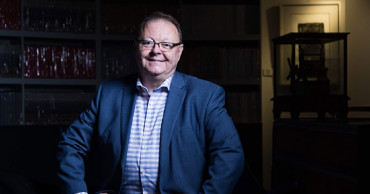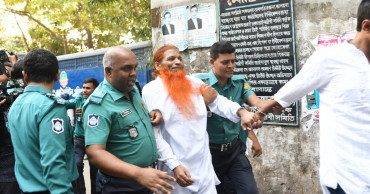Holey Artisan Attack
FS vows to help build terror-free world, pays tribute to Holey Artisan victims
Paying deep tribute to the victims of the 2016 Holey Artisan Bakery terrorist attack, Foreign Secretary Asad Alam Siam on Tuesday said Bangladesh continues to pursue a ‘zero tolerance policy’ against terrorism and violent extremism in all its forms and remains ‘steadfast’ in strengthening its cooperation with all the international partners.
“As we honour the memory of the victims, their unfortunate sacrifices have emboldened our resolve and we are determined to create a world free from terrorism,” he said while speaking at a commemoration event at the residence of Antonio Alessandro, the Ambassador of Italy to Bangladesh.
“We must remain vigilant against any resurgence of terrorism, in Bangladesh and anywhere in the world," said the Italian Ambassador.
He said “those who were thinking, through this heinous attack, to raise hate between locals and expatriates, Muslims and Christians, Bangladesh and foreign Countries, did not succeed. On the contrary, our friendship has grown stronger like our determination to do whatever possible to strengthen our ties and stop terrorism.”
Director General for Italian Citizens Abroad and Migration Policies, Ministry of Foreign Affairs and International Cooperation Luigi Vignali and the Italian Ambassador spoke at the event.
Indian High Commissioner to Bangladesh Pranay Verma, Japanese Ambassador to Bangladesh Saida Shinichi, Chargé d’affaires at the US Embassy in Dhaka Ambassador Tracey Ann Jacobson, representatives of Dhaka Metropolitan Police and the families of the victim also paid tribute to the victims of Holey Artisan attack through the deposition of floral wreaths.
On this day (July 1) nine years ago in 2016, the quiet serenity of the Holey Artisan Bakery in Gulshan was shattered by an ‘act of brutality’.
“Today, we stand united not only in remembrance of that tragic event, but also in reaffirming our unwavering commitment to our collective fight against the global scourge of terrorism and violent extremism,” said the Foreign Secretary.
He said today, once again, they renew their pledge to deepen mutual understanding, foster dialogue and uphold the values of compassion, dignity and respect for all.
“May the souls of those we lost rest in eternal peace. May their memory continue to guide us toward a brighter, peaceful and secure future,” said Foreign Secretary Siam, adding that, “With heavy hearts and solemn resolve, we gather here today to commemorate a day forever inscribed in the collective memory of our nation - 1st of July.”
The Foreign Secretary said the Holey Artisan attack was a cruel affront to their shared humanity and it was an ‘audacious attempt’ to spread fear and division at the very heart of their ‘vibrant, tolerant and inclusive’ society.
“With profound sorrow, we pay rich tribute to the innocent lives lost that night - our own beloved citizens as well as dear friends from India, Italy, Japan and the United States,” he said, offering their heartfelt condolences to their families and friends, as their pain is deeply felt by the people of Bangladesh.
Holey Artisan Attack: JICA organises memorial ceremony for Japanese victims
In the face of that horrific night, Foreign Secretary Siam said, Bangladesh displayed remarkable resilience.
“Our security forces responded with courage and clarity of purpose,” he said, adding that two of them died in confronting the terrorists.
“United in grief, our people stood shoulder to shoulder, demonstrating our collective resolve against those who sought to divide the peace-loving ethos of our people,” said the Foreign Secretary.
Since that tragic day, Siam said they have come a long way as a nation and Bangladesh has taken decisive steps to combat extremism and strengthen counterterrorism capabilities.
He said Bangladesh has expanded community engagement programmes to counter extremist ideas through religious leaders, educators and civil societies; shared information with friendly countries, and strengthened our relevant legislation.
“And importantly, we have brought the perpetrators to justice through a special anti-terrorism tribunal,” said the Foreign Secretary.
He expressed his heartfelt appreciation to the Italian Mission for taking this thoughtful initiative to organize this commemoration.
On that tragic day in 2016, the appalling terrorist attack took away the individual lives of nine Italian, seven Japanese, two Bangladeshis, one US-Bangladeshi, and one Indian citizen and injured many others.
They also solemnly remembered the Bangladeshi law enforcement officials, who were killed or injured responding to this despicable terrorist attack.
8 months ago
High Court bans streaming of ‘Faraaz’ in Bangladesh
The High Court has banned the streaming of “Faraaz” – an Indian film based on the 2016 terrorist attack at the Holey Artisan Bakery in Dhaka’s Gulshan – on online platforms in Bangladesh.
The HC bench of Justice Md Khasruzzaman and Justice Md Iqbal Kabir today passed the order after hearing a writ petition filed against the screening of the movie directed by Hansal Mehta.
Barrister Rokan Uddin Mahmud and the lawyer Ahsanul Karim stood for the petitioner at the court. Deputy Attorney General Bipul Bagmar represented the state.
Read more: Holey Artisan victim's mother vows to fight release of Bollywood film on tragedy
The petition was filed against the streaming of the film online and screening at movie theatres by Ruba Ahmed, mother of Abinta Kabir who was one of the victims of the attack.
“As the film is yet to be approved by the Censor Board, today’s directive does not mention a ban on screening in cinema halls,” the petitioner’s lawyer Ahsanul Karim told UNB.
Produced by T-Series and Benaras Media Works, “Faraaz” is loosely based on the terrorist attack at Holey Artisan Bakery on July 1, 2016. At least 22 people, including 17 foreign nationals, were killed in the attack. Faraaz Ayaaz Hossain and Abinta Kabir were among the victims alongside Tarishi Jain and Ishrat Akhond.
Read more: Abinta Kabir Foundation sends legal notice to FARAAZ movie producers
Two police officers were also killed in the attack.
Since the trailer of Hansal Mehta’s much-talked-about Bollywood film “Faraaz” was released, Ruba Ahmed took to the media to express her objections to releasing and promoting the film in Bangladesh.
Ahmed, alongside the mother of Tarishi Jain, an Indian national who was killed in the attack, has also fought a legal battle at Delhi High Court to stop the release of “Faraaz”. However, the Indian court refused to block the film which was released in theatres across India on February 3.
Read More: Holey Artisan Victim Faraaz's Heroism is Now on the Silver Screen
3 years ago
How Metro Rail almost didn’t happen after Holey attack and how the Sheikh Hasina govt brought it back on track
As Bangladesh jubilantly celebrated the unveiling of another mega project, the much-awaited mass rapid transit ‘Dhaka Metro Rail’, it also solemnly recalled the seven Japanese engineers and consultants who died in the gruesome Holey Artisan Bakery attack in July 2016.
With the launch of a section of Mass Rapid Transit (MRT) Line-6 on December 28, 2022, Bangladesh embarked on a new era of public transport with electricity-powered metro rail that will change the way people travel in one of the most congested cities in the world.
A plaque at a newly inaugurated metro rail station honours the seven Japanese engineers and consultants, who were in Bangladesh to set in motion the construction of the Dhaka Metro Rail, and were among those taken hostage and brutally murdered by armed militants on that fateful night of July 1, 2016.
Also read: Metro rail to start 30 mins later, add Pallabi station from Jan 25
The terror attack by jihadis of the Neo-JMB (Jamaat-ul-Mujahideen Bangladesh) raised severe doubts on Bangladesh’s growth trajectory, with security of foreign nationals coming here to supervise overseas-funded infrastructure projects like the Dhaka Metro Rail emerging as a key issue.
The Bangladesh Government, led by PM Sheikh Hasina, bravely kept its focus on development despite the violence unleashed by jihadi radicals, often backed by the country’s Islamists.
Of the foreigners killed in the terror attack at Holey Artisan Bakery, two women and five men were Japanese nationals. Only one of the eight Japanese experts in Dhaka for the metro rail project made it out of the Holey Artisan Bakery alive.
Read More: Dhaka Metro Rail Uttara to Agargaon Route: A Detail Overview
Tomaoki Watanabe, who was hospitalized after being shot, was one of four employees from Almec, a transportation consultancy firm with offices in Manila, Hanoi, Jakarta and Ulan Bator, according to its website. The other three – Yuko Sakai, Rui Shimodaira and Makoto Okamura – were killed.
Okamura’s father, Komakichi Okamura, told Japanese media that his 32-year-old son’s death was “unbearable as a parent”.
Another victim, Koyo Ogasawara, worked for Katahira & Engineers International that has worked on projects in Southeast Asia, Africa and Latin America.
Read More: Foreign envoys remember those killed in Holey Artisan attack
The other three were working for Oriental Consultants Global. They were identified as Hideki Hashimoto, Nobuhiro Kurosaki and Hiroshi Tanaka.
Japan’s then PM Shinzo Abe, who later died in an attack in Japan, expressed “profound grief and anger” over the deaths of the Japanese nationals in the Holey Artisan attack. “We feel very indignant toward the perpetrators, because these people were working hard for the development of Bangladesh,” said Shinichi Kitaoka, president of the Japan International Cooperation Agency. Kitaoka called for strong security for all Japanese nationals involved with the metro rail and development projects funded by the JICA.
While terrorists carried out the heinous attack, the opposition rushed to manufacture a scare tactic – that the government had failed to check terrorism and Bangladesh was unsafe for foreigners. The opposition had itself launched violent street protests after boycotting the 2014 parliamentary polls.
Read More: Govt satisfied with Holey Artisan attack verdict: Law Minister
When the government resorted to some tough policing and hit back hard at the terrorists, neutralising nearly the entire top leadership of the Neo-JMB, including its Canada-based chief Tamim Ahmed, the same opposition started blaming the government for “blatant violation of human rights”.
Taking on the colossal challenge of completing the Padma Bridge (despite the World Bank pull-out on corruption charges that could not be proven) and the Dhaka Metro Rail project (despite the terror attack) is thus part of a bigger story for the Sheikh Hasina government.
The government stayed on the development course with single-minded focus amidst numerous challenges.
Read More: FM thanks Japan for support in metro rail, other development projects
Sources in the Japanese government have said that it was Bangladesh’s prompt counter-terrorism response that gave its funding agencies the confidence to carry on the metro rail and other projects in Bangladesh.
At the opening of the Dhaka Metro Rail, PM Sheikh Hasina recalled the tumultuous times in her speech and paid tribute to the Japanese consultants who lost their lives in the Holey Artisan attack.
“Though that attack put the work on hold for a while, finally it started again,” Hasina said, recalling the contribution of then Japanese Prime Minister Shinzo Abe.
These accomplishments have a much bigger message for the world: come what may, come hell or high water, Bangladesh is unstoppable.
Read More: Metro rail to start 30 mins later, add Pallabi station from Jan 25
3 years ago
Diplomats pay tribute to Holey Artisan attack victims
Diplomats on Thursday paid tributes to the lives lost in the militant attack at Holey Artisan Bakery in Dhaka's Gulshan five years ago.
They also affirmed that hate will never win.
Also read: Govt satisfied with Holey Artisan attack verdict: Law Minister
Foreign Secretary Masud Bin Momen, Indian High Commissioner to Bangladesh Vikram Kumar Doraiswami, ambassadors of the US, Italy and Japan and other senior diplomats also joined.
4 years ago
Skilled workforce, better infrastructure to help Bangladesh grow faster: Canada
Canadian High Commissioner to Bangladesh Benoit Préfontaine has said Bangladesh needs two things -- skilled workers and better infrastructure -- to be able to create more jobs and continue to grow maintaining the current growth trend.
6 years ago
7 to walk gallows in Holey Artisan Café case
Seven militants were sentenced to death on Wednesday for their roles in the Holey Artisan café attack, the deadliest terror attack in Bangladesh’s history that claimed the lives of 22 people, including 17 foreigners.
6 years ago










